'Unimpeachable Character': John Gleeson, Former Judge and Prosecutor, Returns to Court to Take on Bill Barr
In the Michael Flynn case, the appointment of Debevoise's John Gleeson, a former federal trial judge and prosecutor, was deemed an extraordinary move matching the "exceptional motion the government made to dismiss" Flynn's case, one white-collar lawyer said. "We're kind of in uncharted waters here."
May 15, 2020 at 12:06 AM
9 minute read
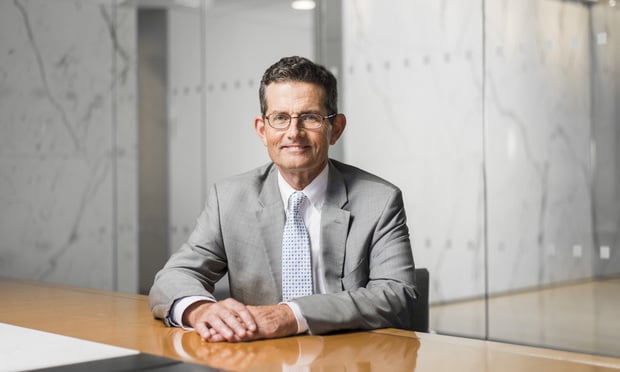 John Gleeson, partner with Debevoise & Plimpton.
John Gleeson, partner with Debevoise & Plimpton.
A quarter-century ago, in a federal courthouse in Brooklyn, John Gleeson remarked that his "whole life" was gathered in the room where he would be formally inducted as a trial judge.
"I don't want to make you nervous," he told the crowd, according to a 1995 article in the New Yorker, "but I can think of some people who wouldn't mind at all if the roof caved in."
It was a dark, perhaps only half-joking reference to his time as a federal prosecutor in Brooklyn, a 10-year tenure headlined by the conviction of John Gotti, the mob boss whose acquittal years earlier earned him the nickname "Teflon Don."
As he stepped into the next phase of his legal career, Gleeson pledged to "try to get to the point where my friends and former colleagues don't burst into laughter when they see me in my robes."
Now in private practice at the law firm Debevoise & Plimpton, four years removed from the federal bench, Gleeson is set in some ways to reprise his former role as a prosecutor. On Wednesday, U.S. District Judge Emmet Sullivan in Washington appointed Gleeson to oppose the Justice Department's extraordinary move to abandon the prosecution of Michael Flynn, the former Trump national security adviser who has twice pleaded guilty to lying to investigators about his past contacts with the Russian ambassador to the U.S.
The assignment positions Gleeson, a Debevoise partner since 2016, to make the case for why the Flynn prosecution should proceed. Sullivan's move followed an op-ed Gleeson co-authored with a pair of former high-ranking Justice Department officials, in which he noted that Flynn's guilt had been "adjudicated" and that Sullivan has the authority to refuse to allow the retired Army general to withdraw his guilty plea and proceed with sentencing.
A Debevoise spokesman declined to comment or make Gleeson, along with others at the firm, available for an interview.
Gleeson's marching order was direct: He must address whether Sullivan should initiate criminal contempt proceedings against Flynn for perjury.
Sullivan's order did not offer any clues to his thinking, but federal trial judges have broad authority to punish anyone who lies before them. Earlier this year, Flynn told Sullivan that he was in fact not guilty and that he had not lied to the FBI, contradicting his earlier assertion, at the time he pleaded guilty, that he was, in fact, guilty.
The exact parameters of Gleeson's role—whether he is allowed to conduct interviews, or issue subpoenas—remain unclear. But legal experts said Gleeson's role could involve a review the evidence underlying the prosecution and possibly even questioning Flynn and government officials involved in the case.
"I don't know how deep a dive Judge Gleeson will feel he has to take into the background and facts of the whole investigation. He may not feel he has to go that deep. Some of this seems plain on its face—either he lied to the FBI or he lied to the court," said Shira Scheindlin, a former federal judge in Manhattan and prosecutor. "It may be simpler than we think—or maybe not. He might do a full-blown investigation."
'An Angry Clark Kent'
In interviews, former federal prosecutors and others familiar with Gleeson said that his past government service—combined with his recent experience as a white-collar defense lawyer—lend him needed credibility as he steps into a crucible as the outside voice in a case that has reignited concerns about the Justice Department's independence.
"No one with a straight face is going to challenge John Gleeson's credibility or his exceptional legal talent," said Crowell & Moring partner Kelly Currie, a former federal prosecutor in Brooklyn who regularly appeared in court before Gleeson. "And so, by choosing him, Judge Sullivan has picked someone with unimpeachable character in that regard."
 Attorney General William Barr. May 1, 2019. Credit: Diego M. Radzinschi / ALM
Attorney General William Barr. May 1, 2019. Credit: Diego M. Radzinschi / ALMThe Justice Department's move to dismiss the case came just months after U.S. Attorney General William Barr overruled career prosecutors to recommend a lighter sentence for Trump's longtime friend Roger Stone. Barr has denied there was any political interference in the Stone and Flynn cases.
"It helped, it upheld the standards of the Department of Justice, and it undid what was an injustice," Barr said of the move to dismiss Flynn's case.
Currie described Sullivan's appointment of Gleeson as an extraordinary move matching the "exceptional motion the government made to dismiss" Flynn's case.
"We're kind of in uncharted waters here," he said.
In his decadelong career as a prosecutor, Gleeson rose to become chief of the criminal division in the U.S. attorney's office in Brooklyn. His tenure was bookended by trials of Gotti, a New York mobster who rose to become boss of the Gambino crime family.
In the late 1980s, Gleeson was a junior member of a prosecution team that tried Gotti on racketeering charges, in a trial that ended in the mob boss' acquittal. In 1992, Gleeson again tried Gotti, winning a conviction on murder, racketeering and other charges.
Gotti was sentenced to life without parole. Gleeson won aplomb in the prosecution for recruiting Salvatore Gravano, Gotti's onetime second-in-command, to testify as a government witness. Gravano's testimony provided a measure of vindication for the earlier trial loss, as he revealed that the Gambinos had bribed a juror in that case.
"He was always a rising star trial lawyer. He was very good in the courtroom," said Scheindlin, a former federal prosecutor in Brooklyn who was nominated to the federal bench the same year as Gleeson.
In 1994, two years after the trial conviction, the New Yorker reported that Gotti called Gleeson a "bum" and "Lord Fauntleroy," among other, more colorful names.
The New Yorker, for its part, described Gleeson as looking like an "angry Clark Kent."
Recounting his nomination to the federal bench, Gleeson said in 2018 he was approached about his interest in becoming a judge following the trial win.
'Visit A Prison Every Year'
For Sullivan, the appointment of an outside voice in Flynn's case served to only burnish his reputation as a judge known for his independent streak. A decade ago, Sullivan became a national voice on issues of prosecution misconduct, having presided over the Justice Department's botched case against the late U.S. Sen. Ted Stevens, the Alaska Republican.
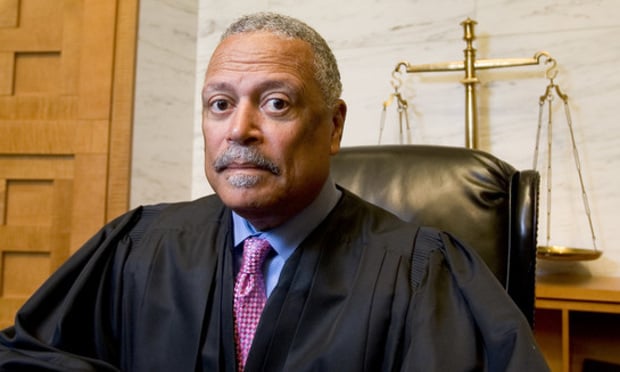 US District Judge Emmet Sullivan of the District of Columbia. Photo by Diego M. Radzinschi/NATIONAL LAW JOURNAL
US District Judge Emmet Sullivan of the District of Columbia. Photo by Diego M. Radzinschi/NATIONAL LAW JOURNALIn Gleeson, he appears to have found a kindred spirit.
In two decades on the federal bench, Gleeson often railed against mandatory minimum prison sentences and the rapidly growing prison population. In some cases, he pushed back against charging decisions and other steps by prosecutors, such as using the threat of mandatory-minimum sentences to force guilty pleas.
In 2014, Gleeson made a personal appeal to Loretta Lynch, then the U.S. attorney in Brooklyn, to vacate two of the convictions of a man who had served nearly two decades of a 57-year sentence for armed carjackings and other serious crimes. Gleeson wrote in a memo that year that prosecutors can "also use their power to remedy injustices."
The man, Francois Holloway, was resentenced to time served after Lynch agreed to vacate two of the three convictions.
Shortly before stepping off the bench, Gleeson called for wider adoption of programs to steer nonviolent drug offenders and juveniles into rehabilitation rather than prison.
"There's no overstating how disabling it is for someone to go through life with a federal felony conviction," Gleeson said in the annual Frank J. Guarini Government Lecture at the New York University School of Law.
More recently, in 2017, Gleeson reflected on how his perspective toward sentencing changed following his rise to the federal bench.
"You do a lot of damage to someone when you impose the sentence. We seem to be, in the last 25 years, intoxicated on the idea that increasing numbers of years in prison is the only way to deal with people who are enmeshed in the criminal justice system," Gleeson said. "Prisons are overcrowded, full of low-level drug trafficking defendants or people who are themselves addicts and whose participation in criminal activity is the result of their addiction."
Gleeson recalled the words of his mentor, said to him as he was taking the federal bench.
"'The most important thing is to have the milk of human kindness, and to have that affect everything you do.' He's the one who told me, 'Visit a prison every year, don't just sentence people and forget about them," Gleeson said. "Go visit a prison, see where people go after you impose that sentence."
'The Best Job in the World'
Some trial judges retire from the bench—and the law. Or they join dispute resolution firms and serve as arbitrators. Still others find homes at law firms.
At Debevoise, Gleeson has represented Toyota in connection with the carmaker's deferred prosecution agreement with the Justice Department resolving claims that the carmaker misled consumers and federal regulators about safety problems. In his first year at Debevoise, he was hired by Wachtell, Lipton, Rosen & Katz to defend the law firm against a malpractice suit brought by a company controlled by Carl Icahn.
He also kept up his advocacy against mandatory minimum sentences.
In 2018, reflecting on his decision to give up the gavel and join Debevoise, Gleeson described being a judge as the "best job in the world."
"Short of being center fielder for the Yankees, or a lead singer in a rock 'n' roll band, it's the best job in the world, not just in the profession," he told Law.com.
This content has been archived. It is available through our partners, LexisNexis® and Bloomberg Law.
To view this content, please continue to their sites.
Not a Lexis Subscriber?
Subscribe Now
Not a Bloomberg Law Subscriber?
Subscribe Now
NOT FOR REPRINT
© 2025 ALM Global, LLC, All Rights Reserved. Request academic re-use from www.copyright.com. All other uses, submit a request to [email protected]. For more information visit Asset & Logo Licensing.
You Might Like
View All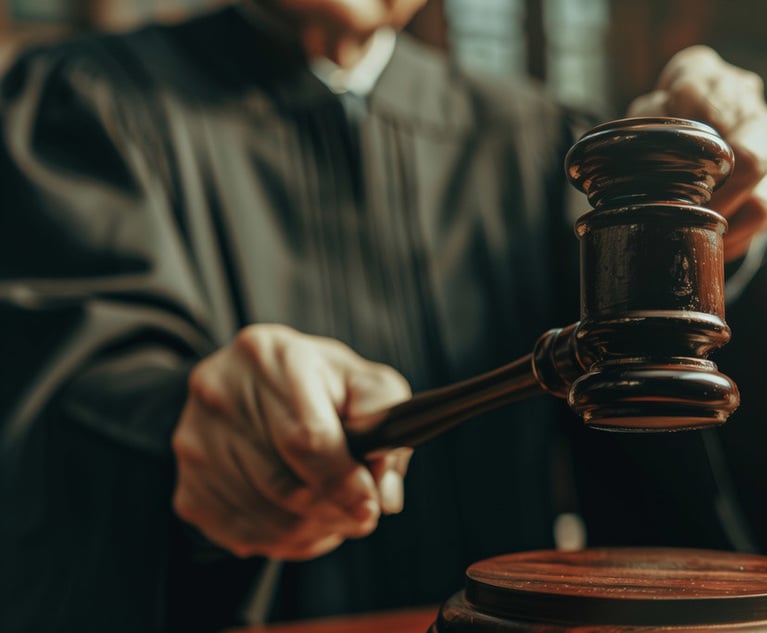
Who Are the Judges Assigned to Challenges to Trump’s Birthright Citizenship Order?
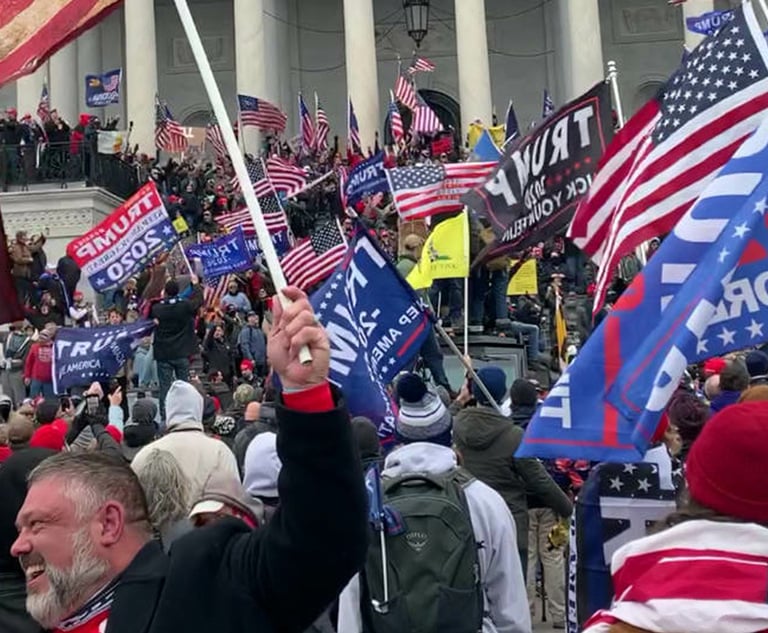
‘Undermines the Rule of Law’: Retired US Judges Condemn Trump’s Jan. 6 Pardons

'If the Job Is Better, You Get Better': Chief District Judge Discusses Overcoming Negative Perceptions
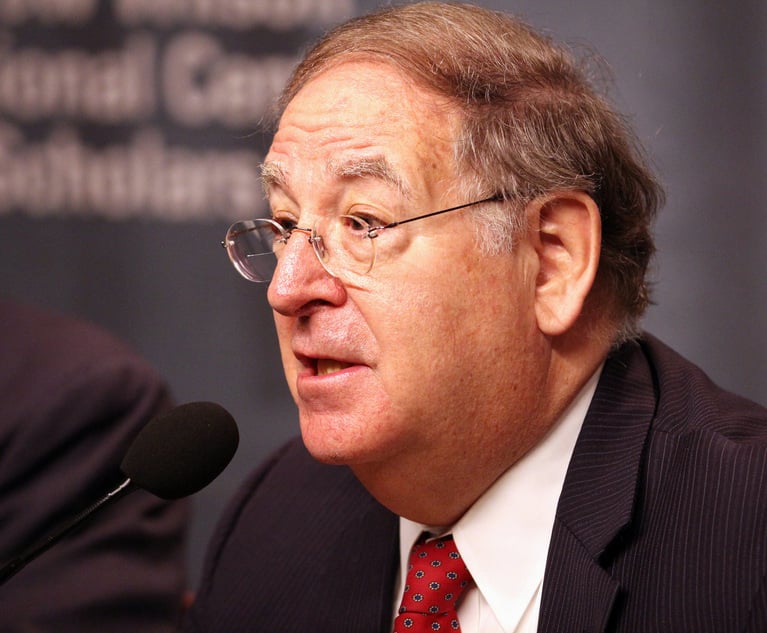
'Thoughtful Jurist': Maryland US District Senior Judge Messitte Dies After Short Illness
4 minute readLaw Firms Mentioned
Trending Stories
- 1Uber Files RICO Suit Against Plaintiff-Side Firms Alleging Fraudulent Injury Claims
- 2The Law Firm Disrupted: Scrutinizing the Elephant More Than the Mouse
- 3Inherent Diminished Value Damages Unavailable to 3rd-Party Claimants, Court Says
- 4Pa. Defense Firm Sued by Client Over Ex-Eagles Player's $43.5M Med Mal Win
- 5Losses Mount at Morris Manning, but Departing Ex-Chair Stays Bullish About His Old Firm's Future
Who Got The Work
J. Brugh Lower of Gibbons has entered an appearance for industrial equipment supplier Devco Corporation in a pending trademark infringement lawsuit. The suit, accusing the defendant of selling knock-off Graco products, was filed Dec. 18 in New Jersey District Court by Rivkin Radler on behalf of Graco Inc. and Graco Minnesota. The case, assigned to U.S. District Judge Zahid N. Quraishi, is 3:24-cv-11294, Graco Inc. et al v. Devco Corporation.
Who Got The Work
Rebecca Maller-Stein and Kent A. Yalowitz of Arnold & Porter Kaye Scholer have entered their appearances for Hanaco Venture Capital and its executives, Lior Prosor and David Frankel, in a pending securities lawsuit. The action, filed on Dec. 24 in New York Southern District Court by Zell, Aron & Co. on behalf of Goldeneye Advisors, accuses the defendants of negligently and fraudulently managing the plaintiff's $1 million investment. The case, assigned to U.S. District Judge Vernon S. Broderick, is 1:24-cv-09918, Goldeneye Advisors, LLC v. Hanaco Venture Capital, Ltd. et al.
Who Got The Work
Attorneys from A&O Shearman has stepped in as defense counsel for Toronto-Dominion Bank and other defendants in a pending securities class action. The suit, filed Dec. 11 in New York Southern District Court by Bleichmar Fonti & Auld, accuses the defendants of concealing the bank's 'pervasive' deficiencies in regards to its compliance with the Bank Secrecy Act and the quality of its anti-money laundering controls. The case, assigned to U.S. District Judge Arun Subramanian, is 1:24-cv-09445, Gonzalez v. The Toronto-Dominion Bank et al.
Who Got The Work
Crown Castle International, a Pennsylvania company providing shared communications infrastructure, has turned to Luke D. Wolf of Gordon Rees Scully Mansukhani to fend off a pending breach-of-contract lawsuit. The court action, filed Nov. 25 in Michigan Eastern District Court by Hooper Hathaway PC on behalf of The Town Residences LLC, accuses Crown Castle of failing to transfer approximately $30,000 in utility payments from T-Mobile in breach of a roof-top lease and assignment agreement. The case, assigned to U.S. District Judge Susan K. Declercq, is 2:24-cv-13131, The Town Residences LLC v. T-Mobile US, Inc. et al.
Who Got The Work
Wilfred P. Coronato and Daniel M. Schwartz of McCarter & English have stepped in as defense counsel to Electrolux Home Products Inc. in a pending product liability lawsuit. The court action, filed Nov. 26 in New York Eastern District Court by Poulos Lopiccolo PC and Nagel Rice LLP on behalf of David Stern, alleges that the defendant's refrigerators’ drawers and shelving repeatedly break and fall apart within months after purchase. The case, assigned to U.S. District Judge Joan M. Azrack, is 2:24-cv-08204, Stern v. Electrolux Home Products, Inc.
Featured Firms
Law Offices of Gary Martin Hays & Associates, P.C.
(470) 294-1674
Law Offices of Mark E. Salomone
(857) 444-6468
Smith & Hassler
(713) 739-1250








